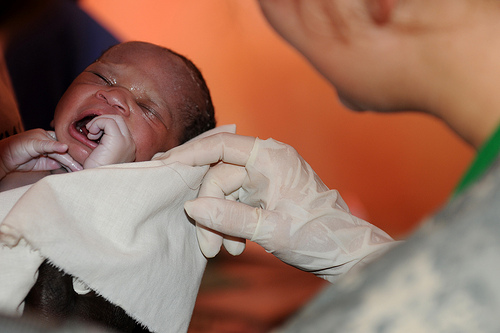The Health Policy Project ended in 2016. Work continued under Health Policy Plus (HP+) until 2022.
NEWS & VIEWS
Posted March 21, 2013
 |
A medic in northern Uganda hands a newborn to his mother.Photo by Maj. Corey Schultz, Army Reserve Communications, US Army Africa |
WASHINGTON, DC—A new literature review published in the journal AIDS and Behavior finds that concerns about HIV-related stigma can discourage pregnant women in low-income settings from seeking services for their own health and to prevent mother-to-child transmission (PMTCT) of HIV. These findings highlight a serious challenge to international goals to virtually eliminate mother-to-child HIV transmission and reduce HIV-related maternal mortality by 50 percent by 2015.
In their review of 150 journal articles and reports, authors Janet M. Turan (University of Alabama at Birmingham) and Laura Nyblade (Health Policy Project and RTI, International) found strong evidence that HIV stigma inhibits uptake of services along the multiple steps of the PMTCT cascade that must be followed, beginning with HIV testing during pregnancy through infant feeding. This incremental drop-off in uptake and retention across the steps of the PMTCT cascade means that women and infants at risk of HIV infection may not take advantage of life-saving PMTCT programs when they are available.
For example, some pregnant women may avoid antenatal care (ANC) services altogether if they fear they will be forced to get tested for HIV. Those who do access ANC may refuse HIV testing, or may not be offered testing at all by health workers who have stigmatizing attitudes. Among women who do reach later stages of PMTCT services, some who test HIV-positive may decide not to enroll in treatment and care programs for themselves or their infants for fear that their HIV status will become known to the larger community. Anticipated, perceived, or actual experiences of stigma thus act as significant barriers to uptake of PMTCT services.
"The world has set an ambitious agenda to eliminate newborn HIV infection and reduce maternal mortality," said Sarah Clark, Director of the USAID-supported Health Policy Project (HPP) at Futures Group. "We will not get to zero new infections without addressing stigma and discrimination."
The authors recommend renewed attention to strategies to reduce HIV-related stigma, improve confidentiality, and increase acceptance of these services through community outreach, media campaigns, and advocacy.
Turan, Janet M. and Laura Nyblade. 2013. HIV-Related Stigma as a Barrier to Achievement of Global PMTCT and Maternal Health Goals: A Review of the Evidence. AIDS and Behavior. Available online at http://www.springerlink.com/openurl.asp?genre=article&id=doi:10.1007/s10461-013-0446-
Learn more about the Health Policy Project's activities in stigma and discrimination.
What's New
- Something to Build On: “Innovation Exchange” Celebrates the Health Policy Project’s Close and a New Beginning
- What Will it Take for Tanzania to Achieve ART Targets and Ensure Long-Term Sustainability of the HIV Response?
- Helping Kenya’s County Leaders Advocate for Increased Health Investments
- HPP Holds Working Meeting on Ensuring Responsible PEPFAR Transitions for Key Populations
- Health Policy Project Celebrates 2016 International Women's Day
- HPP Staff Participate in White House Conference on HIV Stigma Reduction

